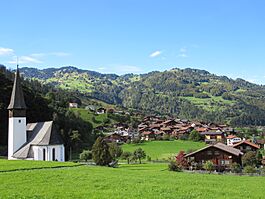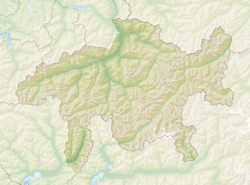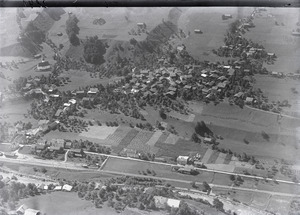Jenaz facts for kids
Quick facts for kids
Jenaz
|
||
|---|---|---|
 |
||
|
||
| Country | Switzerland | |
| Canton | Graubünden | |
| District | Prättigau/Davos | |
| Area | ||
| • Total | 25.91 km2 (10.00 sq mi) | |
| Elevation | 755 m (2,477 ft) | |
| Population
(Dec 2020 )
|
||
| • Total | 1,147 | |
| • Density | 44.269/km2 (114.66/sq mi) | |
| Postal code |
7233
|
|
| Surrounded by | Fideris, Furna, Luzein, Peist, Schiers | |
Jenaz is a small village in Switzerland. It is located in an area called the Prättigau, which is part of the Graubünden canton. Jenaz is also a municipality, which is like a local government area. Its name in the Romansh language is Gianatsch.
Contents
History of Jenaz
Jenaz was first mentioned in old writings around the second half of the 12th century. Back then, it was known as Junazis.
Where is Jenaz? (Geography)
Jenaz covers an area of about 26 km2 (10 sq mi). A large part of this land, about 48.1%, is used for farming. Forests cover another 38.8% of the area.
About 3% of the land has buildings or roads. The rest, about 10.1%, is made up of things like rivers, glaciers, or mountains.
Before 2017, Jenaz was in a smaller area called the Jenaz sub-district. Now, it is part of the larger Prättigau/Davos Region. The municipality includes the old village of Jenaz, which sits on a raised area above the Landquart river. There's also a newer village along the valley floor. You can also find the small village of Rüti and the area of Pragg-Jenaz here.
Who Lives in Jenaz? (Population)
Jenaz has a population of 1,147. About 7.5% of the people living in Jenaz are from other countries. Over the last 10 years, the number of people living here has gone down a little.
Most people in Jenaz speak German (95.3%). A smaller number speak Albanian (1.1%) or Romansh (0.8%).
In 2000, about half the population was male (49.8%) and half was female (50.2%).
- About 11.3% of the people were children aged 0 to 9 years old.
- About 12.9% were teenagers aged 10 to 19.
- About 10.2% were young adults aged 20 to 29.
- About 14.9% were aged 30 to 39.
- About 14.4% were aged 40 to 49.
- About 13.5% were aged 50 to 59.
- About 9.3% were aged 60 to 69.
- About 8.0% were aged 70 to 79.
- About 4.8% were aged 80 to 89.
- About 0.8% were aged 90 to 99.
In the 2007 Swiss election, the most popular political party was the FDP. They received 43.1% of the votes. Other popular parties were the SVP (38.7%) and the SP (12.2%).
Most adults in Jenaz (aged 25-64) have completed higher education. This means they have gone to a university or a special college.
Jenaz has a very low unemployment rate, which means almost everyone who wants a job has one.
- In 2005, about 81 people worked in the primary economic sector. This means they worked in farming or forestry.
- About 144 people worked in the secondary sector. These jobs include making things in factories or construction.
- About 99 people worked in the tertiary sector. This includes jobs like teaching, healthcare, or working in shops.
In 2000, most people in Jenaz belonged to a Christian church. About 12.9% were Roman Catholic and 76.3% belonged to the Swiss Reformed Church. A small number of people were Islamic (3.81%). Some people did not belong to any church.
Here's how the population of Jenaz has changed over time:
| year | population |
|---|---|
| 1850 | 806 |
| 1888 | 997 |
| 1900 | 820 |
| 1950 | 1,053 |
| 2000 | 1,130 |
Getting Around Jenaz (Transportation)
Jenaz has two train stations: Jenaz and Furna. These stations are on the Landquart–Davos Platz line. You can catch trains from here to places like Disentis/Mustér, Scuol-Tarasp, Landquart, St. Moritz, and Davos Platz.
See also
 In Spanish: Jenaz para niños
In Spanish: Jenaz para niños
 | Victor J. Glover |
 | Yvonne Cagle |
 | Jeanette Epps |
 | Bernard A. Harris Jr. |





